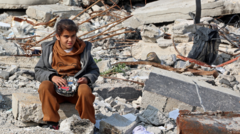With new political dynamics following Donald Trump's election and ongoing military tensions, hopes for a Gaza hostage release deal are rising. While gaps remain between Israel and Hamas, shifting alliances and pressures suggest a unique opportunity for negotiations that have stalled for months.
Prospects for a Gaza Hostage Deal: Shifting Political Landscape

Prospects for a Gaza Hostage Deal: Shifting Political Landscape
As indirect talks progress between Israel and Hamas, the election of Donald Trump and mounting military and political pressures indicate a potential breakthrough in reaching a ceasefire.
The prospect of a Gaza hostage deal is gaining renewed attention as political and military developments converge in the region. The negotiations between Israel and Hamas, which have lingered for months, are now influenced by the impending presidency of Donald Trump. The U.S. President-elect has openly warned that “all hell” will break loose if hostages are not released before his inauguration on January 20. His victory may signal a significant shift in U.S. policy—possibly loosening the constraints that the outgoing Biden administration imposed on Israel in relation to the conflict.
Israel too may feel compelled to act, as Trump's administration might pursue a broader peace agenda that favors regional stability and the image of a peacemaking leader. However, the pressure is also mounting within Israel; Prime Minister Netanyahu is being pulled in different directions—on one hand by his right-wing coalition partners, who demand the continuation of military action, and on the other, by military leaders advocating for negotiations due to diminishing tactical gains.
Recent military casualties have intensified the scrutiny on the war as key figures reportedly challenge Netanyahu's strategy, suggesting that a military victory over Hamas may be increasingly elusive. Simultaneously, developments in the Middle East, particularly the weakening of Hamas' allies, help create a more nuanced landscape for negotiations.
Despite these shifting tides offering a glimmer of hope for a resolution, significant hurdles remain. There are inherent conflicts in the priorities of Hamas and Israel: Hamas seeks an end to hostilities, while Israel wishes to retain the option of resuming military action for political leverage. The framework for a possible agreement, as laid out by President Biden, involves a phased approach aimed at achieving a permanent ceasefire, but guarantees and assurances for both parties are critical to moving forward.
In this intricate diplomatic environment, heightened activity in Doha, where talks are being driven by high-ranking officials from Israel's security agencies, signals a serious attempt to resolve the crisis. The arrival of Palestinian negotiators adds to the momentum. While the deal isn't finalized and negotiations have faltered previously, the current convergence of forces might finally lead to a breakthrough in this protracted conflict.























